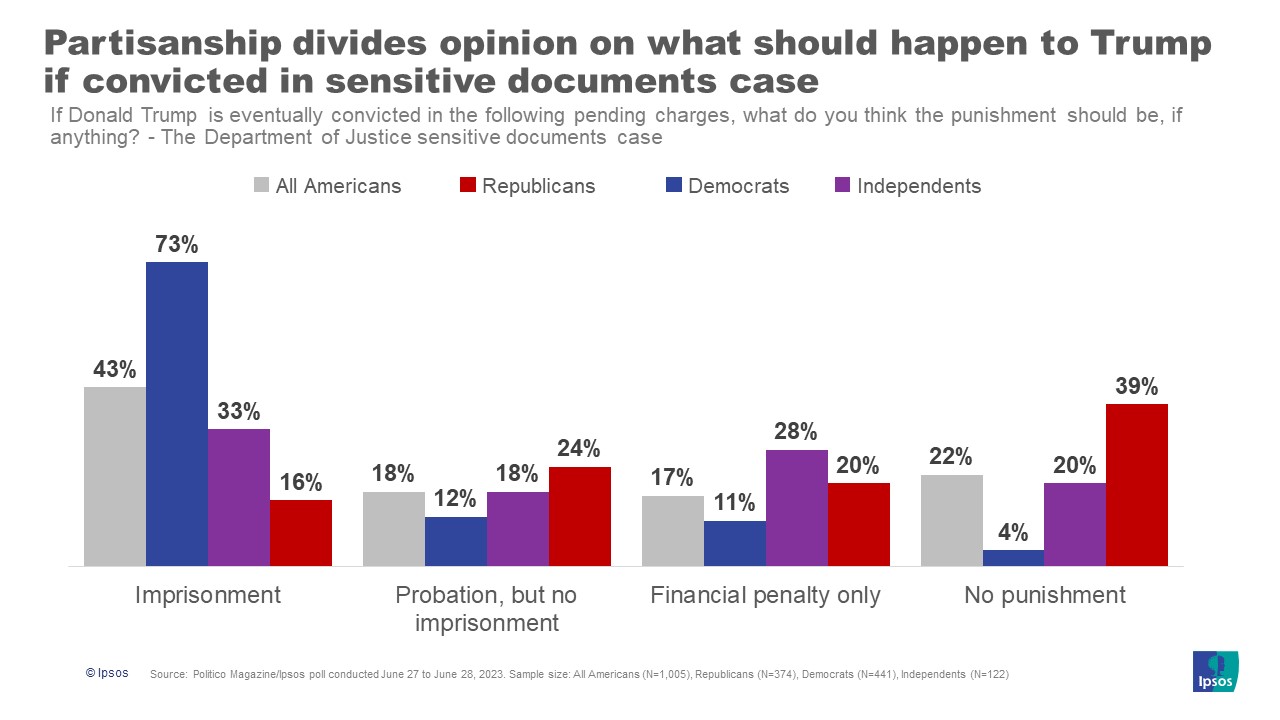Most Americans think Trump should head to trial before the 2024 election
Washington D.C., July 06, 2023 – More than half of all Americans think former President Donald Trump should head to trial ahead of both the 2024 Republican primaries and the 2024 presidential election, according to a new Politico Magazine/Ipsos poll conducted following Trump’s second indictment. Opinions on this vary by party: while the majority (86%) of Democrats think Trump should be put on trial before the 2024 presidential election, just under half of Republicans (46%) think the same.

These findings represent the results of a poll of 1,005 Americans conducted between June 27 and June 28, 2023.
Detailed Findings
- Most Americans think Trump’s trial should occur before the 2024 presidential election.
- The majority of Americans (57%) believe the trial should occur before the Republican primary election and more say the trial should occur before the 2024 presidential election (62%).
- Just under half of all Republicans (42%) say they think Trump should be put on trial before the 2024 Republican primaries in early 2024, while 40% think he shouldn’t. Most Democrats (77%) think Trump should be put on trial before the Republican primaries, while 47% of independents think the same.
- If convicted on either of the charges, a plurality of Americans think Trump should be imprisoned.
- Americans are split when it comes to other options, with around one in five saying Trump should either receive probation but no imprisonment, financial penalty only, or no punishment.
- However, views differ by partisanship with a plurality of Republicans thinking Trump should receive no punishment if convicted in either case (39% in the sensitive documents case, 38% in the falsifying business records case). Independents are divided but most likely to favor imprisonment in both cases (33% and 36%). Most Democrats would favor imprisonment in both cases (73% and 65%).
- Views on Trump’s two indictments are mixed, with about half of Americans feeling Trump is guilty in both criminal cases.
- Among all Americans, 49% say they think Trump is guilty on the sensitive documents case, while 48% say they think he is guilty on the falsifying business records case. About a third say they don’t believe Trump is guilty on either case (31% for both cases), while a fifth say they don’t know.
- Partisanship is the biggest driver of these attitudes: the majority of Democrats say they think Trump is guilty in both cases (81% in the sensitive documents case, 81% in the falsifying business records case), while few Republicans agree (25%, 24%, respectively). A plurality of independents say they don’t know if Trump is guilty (43%, 44%) in either case.
- The charges and potential guilty verdicts in these cases all have roughly the same impact on public support for Trump.
- In both cases, few feel the charges make them more likely to support Trump for president, with one in ten saying the charges make them more likely to support Trump in both cases (12% in the sensitive documents case, 11% in falsifying business records case).
- Though, a minority of Republicans are more likely to say the charges in both cases make them more likely to support Trump (24% in the sensitive documents case, 21% in the falsifying business records case). Few Democrats (3% sensitive documents case, 4% falsifying business records case) or independents (11%, 7%) agree.
- Instead, Americans feel the charges have no impact on their support for Trump or make them less likely to support him.
- Americans are around equally likely to say the charges in the sensitive documents case or the falsifying business records case makes them less likely to support Trump (41% for both) or have no impact on their support (37% in the sensitive documents case, 38% in the falsifying business records case).
- A majority of Americans say they understand “somewhat” or “very” well the specifics of the case, a few say they understand the charges in either case “very well” though.
- Roughly two in three Americans say they understand the charges in the sensitive documents (68%) and falsifying business records case (66%).
- Democrats are slightly more likely to say they understand both the details of the sensitive document case (75%) and falsifying business case (75%) than Republicans (64% and 61%).
About the Study
These are the findings of a Politico Magazine/Ipsos poll was conducted June 27 to June 28, 2023. For this survey, a sample of 1,005 adults age 18 or older from the continental U.S., Alaska, and Hawaii was interviewed online in English. The sample includes 374 Republicans, 441 Democrats, and 122 independents.
The sample was randomly drawn from Ipsos’ online panel, partner online panel sources, and “river” sampling and does not rely on a population frame in the traditional sense. Ipsos uses fixed sample targets, unique to each study, in drawing a sample. After a sample has been obtained from the Ipsos panel, Ipsos calibrates respondent characteristics to be representative of the U.S. Population using standard procedures such as raking-ratio adjustments. The source of these population targets is U.S. Census 2022 American Community Survey data. The sample drawn for this study reflects fixed sample targets on demographics. Post-hoc weights were made to the population characteristics on gender, age, race/ethnicity, region, education, and political party affiliation.
Statistical margins of error are not applicable to online non-probability polls. All sample surveys and polls may be subject to other sources of error, including, but not limited to coverage error and measurement error. Where figures do not sum to 100, this is due to the effects of rounding. The precision of Ipsos online polls is measured using a credibility interval. In this case, the poll has a credibility interval of plus or minus 3.8 percentage points for all respondents. Ipsos calculates a design effect (DEFF) for each study based on the variation of the weights, following the formula of Kish (1965). This study had a credibility interval adjusted for design effect of the following (n=1,005, DEFF=1.5, adjusted Confidence Interval=+/-5.3 percentage points).
The poll also has a credibility interval of plus or minus 5.7 percentage points for Democrats, plus or minus 6.2 percentage points for Republicans, and plus or minus 10.9 percentage points for independents.
For more information on this news release, please contact:
Chris Jackson
Senior Vice President, US
Public Affairs
+1 202 420-2025
[email protected]
About Ipsos
Ipsos is one of the largest market research and polling companies globally, operating in 90 markets and employing over 18,000 people.
Our passionately curious research professionals, analysts and scientists have built unique multi-specialist capabilities that provide true understanding and powerful insights into the actions, opinions and motivations of citizens, consumers, patients, customers or employees. Our 75 solutions are based on primary data from our surveys, social media monitoring, and qualitative or observational techniques.
Our tagline "Game Changers" sums up our ambition to help our 5,000 customers move confidently through a rapidly changing world.
Founded in France in 1975, Ipsos has been listed on the Euronext Paris since July 1, 1999. The company is part of the SBF 120 and Mid-60 indices and is eligible for the Deferred Settlement Service (SRD).ISIN code FR0000073298, Reuters ISOS.PA, Bloomberg IPS:FP www.ipsos.com



